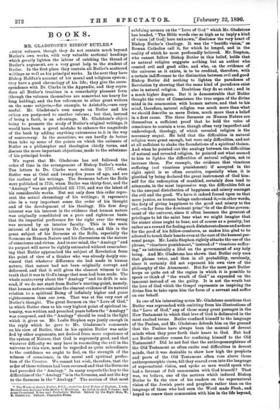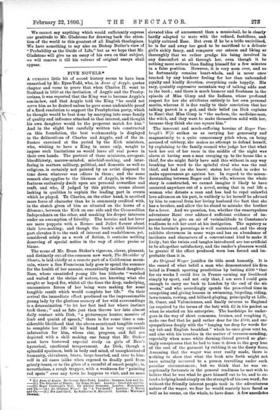BOOKS.
MR. GLADSTONE'S BISHOP BUTLER.*
s HESE volumes, though they do not contain much beyond Butler's own works, with very valuable sectional headings which greatly lighten the labour of catching the thread of Butler's argument, are a very great help to the student of Butler. In the first place they contain all Butler's scattered writings as well as his principal works. In the next they have Bishop Halifax's account of his moral and religions system; they have a good chronology of his life; they give the corre- spondence with Dr. Clarke in the Appendix, and they repro- duce all Butler's treatises in a remarkably pleasant form (though the volumes themselves are somewhat too heavy for long holding), and the few references to other great writers on the same subjects,—for example, to Aristotle,—are very useful. Mr. Gladstone's own essays on Butler and his critics are postponed to another volume ; but that, instead of being a fault, is an advantage. Mr. Gladstone's object being to promote the study of Butler's original writings, it
would have been a great mistake to enhance the magnitude of the book by adding anything extraneous to it in the way of controversy. In the meantime, we can hardly do better than take up some of the points on which the estimate of Butler as a philosopher and theologian chiefly turns, and discuss the more important objections_made to the substance of his principal books.
We regret that Mr. Gladstone has not followed the order of time in the arrangement of Bishop Butler's works. The letters to Dr. Clarke were written in 1717, when Butler was at Oriel and twenty-five years of age, and are the earliest of his writings. The Sermons before the Rolls were published in 1726, when Butler was thirty-four, and the "Analogy" was not published till 1736, and was the latest of his considerable works. But not only does this order repre- sent the actual chronology of his writings ; it represents also in a very important sense the order of his thought and of the development of his theology. His first deep interest was his interest in the evidence that human nature was originally constituted on a pure and righteous basis, that its impartial preference for the right over the wrong was secured by an interior faculty. This is the main interest of his early letters to Dr. Clarke, and this is the great subject of his Sermons at the Rolls, especially the Sermons on Human Nature and his discussions on the nature of conscience and virtue. And to our mind, the " Analogy " and its purport will never be rightly estimated without remember- ing that Butler approached the subject of Revelation from the point of view of a thinker who was already deeply con- vinced that whatever difference sin had made in human nature, that nature had not been originally corrupt and deformed, and that it still gives the clearest witness to the truth that it was in God's image that man had been made. The whole controversy about the " Analogy " and its drift is mis- read, if we do not start from Butler's starting-point, namely, that human nature contains the clearest evidence of its natural relation to a spiritual Being of infinitely higher and purer righteousness than our :own. That was at the very root of Butler's thought. The great Sermon on the "Love of God," in which Butler rises to his very highest point of spiritual in- tensity, was written and preached years before the "Analogy" was composed, and the " Analogy " should be read in the light which it gives us. Mr. Leslie Stephen says justly enough in the reply which he gave to Mr. Gladstone's comments on his view of Butler, that in his opinion Butler was satis- fied by other arguments, not derived from mere experience of the system of Nature, that God is supremely good, and that whatever difficulty we may have in reconciling the evil in the universe to this view, must be regarded as quite subordinate to the confidence we ought to feel, on the strength of the witness of conscience, in the moral and spiritual perfec- tion of the Creator. We cannot but wish, therefore, that the order of these volumes had been reversed and that the Sermons had preceded the "Analogy." In many respects the key to the difficulties of the " Analogy " is in the Sermons, and not the key to the Sermons in the "Analogy." The section of that most
• The Works of Joseph Butler, D.C.L., sometime Lord Bishop of Durham. 2 vols. Divided into Sections with Sectico at Headings. An Index to each Volume ; and Nome Occasional Note. ant Prefactory Matter. Edited by the Eight lion. W. M. Gladstne. Oxford: Clarendon Prose.
subduing sermon on the "Love of God" which Mr. Gladstone has headed, "The Bible words rise so high as to imply a kind of vision [of God] here unknown," discloses the very heart of Bishop Butler's theology. It was the "beatific vision," as Roman Catholics call it, for which he longed, and in the reality of which he most profoundly believed. Mr. Stephen, who cannot follow Bishop Butler in this belief, holds that as natural religion suggests nothing but an author who created evil and good alike, and who, on the evidence of the universe as it exists, is to be credited, therefore, with a certain indifference to the distinction between evil and good Bishop Butler did nothing to lighten the paradoxes of Revelation by showing that the same kind of paradoxes exist also in natural religion. Doubtless they do so exist ; and in a much higher degree. But it is demonstrable that Butler thought the voice of Conscience the true organ of the divine mind in its communion with human nature, and that to his mind, therefore, natural religion was much more than what we should describe as mere Deism, much more than a belief in a first catuse. The three Sermons on Human Nature are themselves a sufficient proof that he held the voice of conscience to contain a true, though often very imperfect and undeveloped, theology, of which revealed religion is the necessary sequel. He held that the difficulties in natural religion were great enough, but were only difficulties, and not at all sufficient to shake the foundations of a spiritual theism.
And when he pointed out the analogy between the difficulties of natural and revealed religion, he pointed out what seemed
to him to lighten the difficulties of natural religion, not to
increase them. For example, the evidence that vicarious suffering (not vicarious punishment) if accepted in the right spirit is so often curative, especially when it is glorified by being declared the great instrument of God him- self for the redemption of mankind, certainly does tend to attenuate, in the most impressive way, the difficulties felt as to the unequal distribution of happiness and misery amongst the evil and the good. We have it indeed forced upon us that mere justice, as human beings understand it,—in other words,
the duty of giving happiness to the good and misery to the evil,—is far from the dominant princ,le of the divine govern-
ment of the universe, since it often becomes the greatest of privileges to let the saint bear what we might imagine that the sinner alone ought to bear, not of course as a penalty, but rather as a reward for feeling such disinterestedness and ardour for the good of his fellow-creatures, as makes him glad to be allowed to touch their hearts even at the cost of the keenest per- sonal pangs. Mr. Leslie Stephen rightly attacks the use of the phrase, "vicarious punishment," instead of "vicarious suffer- ing," as intrinsically a libel on the government of any holy being. And Mr. Gladstone has shown that Butler only uses that phrase twice, and then in all probability, carelessly, since it certainly did not represent his own view of the philosophy of the Atonement. But for the most part Butler keeps us quite out of the region in which it is possible to speak or think of "the wrath of God" as expended on the innocent instead of on the guilty. It is not the wrath but the love of God which the Gospel represents as inspiring the divine Son to take upon him the form of a servant and suffer on our behalf.
In one of his interesting notes Mr. Gladstone mentions that Butler was reproached with omitting from his illustrations ol the "Love of God," any of those many great passages in the New Testament in which that love of God is delineated in the most exalted terms. Butler confined himself to the language of the Psalms, and Mr. Gladstone defends him on the ground that the Psalms have always been the manual of devout minds when they pour forth their heart to God. But had not Butler another reason for confining himself to the Old Testament ? Did he not feel that the anthropomorphisms of the Old Testament so often excite real difficulties in devout minds, that it was desirable to show how high the prophets and poets of the Old Testament often rose above those anthropomorphic views, till they soared even into the language of supernatural vision, and spoke as men would speak who had a forecast of fall communion with God himself ? That was, we believe, one of the motives which induced Bishop Butler to fix the view of his readers on the supernatural vision of the Jewish poets and prophets rather than on the language of those who had seen the Word made Flesh, and hoped to renew their communion with him in the life beyond.
We cannot say anything which would sufficiently express our gratitude to Mr. Gladstone for drawing back the atten- tion of the world to this greatest of all English theologians. We have something to say also on Bishop Butler's view of "Probability as the Guide of Life," but as we hope that Mr. Gladstone will give us an essay of his own on that subject, we will reserve it till his volume of original essays shall appear.



































 Previous page
Previous page